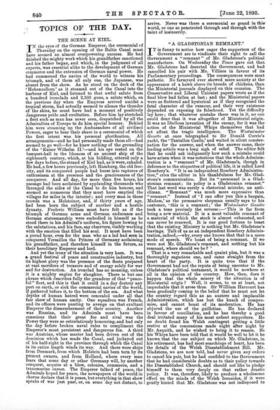TOPICS OF THE DAY.
THE SCENE AT KIEL.
IN the eyes of the German Emperor, the ceremonial of Thursday on the opening of the Baltic Canal must have seemed an almost overpowering success. He had finished the mighty work which his grandfather sanctioned and his father began, and which, in the judgment of all experts, was essential alike to the development of German commerce and the extension of German naval power. He had summoned the navies of the world to witness his triumph, and of them all only one, the Japanese, was absent from the show. As he stood on the deck of the ' Hohenzollern' as it steamed out of the Canal into the harbour of Kiel, and listened to that awful salute from a hundred iron clads and 2,500 guns, a salute which, on the previous day when the Empress arrived amidst a tropical storm, had actually seemed to silence the thunder of the skies, he must have had a moment of positively dangerous pride and exultation. Before him lay stretched a fleet such as man has never seen, despatched by all the Admiralties of Europe to do him special honour. Behind him were steaming up the Ambassadors of all civilised Powers, eager to bear their share in a ceremonial of which the first intent was his personal glorification. All arrangements—and he had personally made them all—had seemed to go well—for he knew nothing of the grounding of the 'Kaiser Wilhelm II.'—and his eye rested on the banquet-hall in the likeness of an ancient ship of the eighteenth century, which, at his bidding, uttered only a few days before, the strand of Kiel had, as it were, exhaled. He had, a few hours previously, left Hamburg, the old free- city, and its conquered people had burst into raptures of enthusiasm at the presence and the graciousness of the conqueror. And all day, for more than five hours, his passage had been acclaimed by applauding thousands who thronged the sides of the Canal to do him honour, and seemed so numerous that they must have emptied the villages for miles in the interior; and every man in those crowds was a Holsteiner, and, if thirty years of age, had been born the subject of another and a hostile dynasty. Frederic William must have felt as if the triumph of German arms and German endurance and German statesmanship were embodied in himself as he stood there in his Admiral's uniform, his figure bowing to the salutations, and his face, say observers, visibly working with the emotion that filled his soul. It must have been a proud hour, even for the man who as a lad had seen in conquered Versailles the Princes of Germany acclaiming his grandfather, and therefore himself in the future, as their hereditary Emperor and lord. And yet the irony of the situation is very keen. It was a grand festival of peace and constructive industry, but its highest glory was the presence of the fleets prepared at vast sacrifices of treasure and of energy solely for war and for destruction. An ironclad has no meaning, unless it is a mighty engine for slaughter: There is but one phrase which describes fully the grandeur of that "peace- ful" fleet, and this is that it could in a day destroy any port on earth, or sink the commercial navies of the world, if gathered before it, to the bottom of the sea. And what depths of human hatred were concealed under all that fair show of human amity. One squadron was French, and its officers were panting to avenge on that exultant Emperor the dismemberment of their country. Another was Russian, and its Admirals must have been conscious that their great foe and rival was the Power they were so ostentatiously honouring, and had only the day before broken naval rules to compliment the Emperor's most persistent and dangerous foe. A third was Austrian, whose master had been driven out of the dominion which has made the Canal, and jockeyed out of his half-right in the province through which the Canal in its entire length winds its way. And there were ships from Denmark, from which Holstein had been torn by its present owners, and from Holland, where every man fears that some day or other Germany will, by another conquest, acquire at a blow, colonies, commerce, and a transmarine career. The Emperor talked of peace, the Admirals hoped for peace, the newspapers of the world in chorus declare that it is peace, but everything in that show speaks of war just past, or, on some day not distant, to arrive. Never was there a ceremonial so grand in this- world, or one so penetrated through and through with the taint of insincerity.


































 Previous page
Previous page